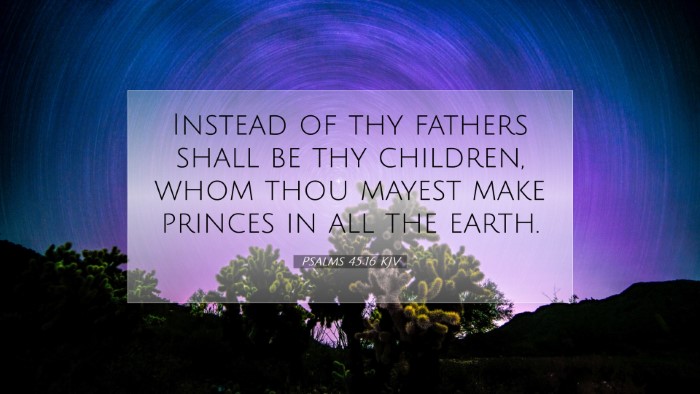Commentary on Psalms 45:16
Psalms 45:16 states:
"Instead of thy fathers shall be thy children, whom thou mayest make princes in all the earth."
Introduction
This verse is part of a royal wedding psalm, traditionally understood to speak of the idealized king and possibly the Messiah. The themes of lineage, royal succession, and the flourishing of future generations resonate deeply within the broader narrative of Scripture.
Commentators including Matthew Henry, Albert Barnes, and Adam Clarke provide valuable insights into the implications of this text, particularly concerning its theological significance and application to both the original audience and contemporary believers.
Contextual Background
Understanding Psalms 45 requires some historical context. It is believed to be a wedding song, possibly celebrating the marriage of King Solomon or a Davidic king. The psalm exudes a tone of celebration, majesty, and divine approval.
Matthew Henry highlights that the psalm portrays the king not only as a political figure but also as one anointed by God. This adds a layer of theological significance as it shifts the focus from mere human governance to divine ordination.
Analysis of Key Themes
-
Royal Lineage:
Henry notes that “instead of thy fathers” reflects a shift from previous generations to the next, emphasizing the king's role in establishing a new dynasty. The father figure symbolizes past rulers, and the children represent future leaders who will carry forward the legacy. This notion is not just political; it speaks to the broader biblical theme of inheritance and covenant.
-
Diversity of Roles:
Albert Barnes comments on the phrase “whom thou mayest make princes.” This indicates a proactive role for the king, suggesting that he actively raises the next generation to positions of authority. This can be interpreted as an encouragement for current leaders to invest in future generations, ensuring the continuation of righteous leadership.
-
Theological Implications:
Adam Clarke emphasizes the messianic interpretation of this psalm. Here, the passage prefigures the role of Christ who not only fulfills the role of king but also as the one who includes believers as heirs in God's kingdom. The concept that Jesus makes “princes” out of those who were once outcasts or disenfranchised is vital for understanding New Testament theology.
Application for Pastors and Theologians
For pastors and theologians, Psalms 45:16 presents an opportunity to reflect on the importance of leadership development within the church. As the psalmist indicates, effective leaders are essential for the health and vitality of God’s people. Here are several applications:
-
Investing in Future Leaders:
Church leaders should be committed to mentoring and equipping the next generation. The king’s role in producing princes underscores the significance of raising disciples who will carry on the mission of the church.
-
Divine Purpose in Leadership:
Leaders must recognize their role is not merely administrative but divinely appointed. The idea that leadership positions are a result of God’s choosing prompts a humility that is necessary for genuine service.
-
Acknowledging a Royal Priesthood:
This passage foreshadows the New Testament concept of all believers as part of a royal priesthood (1 Peter 2:9). Pastors are encouraged to preach this identity, empowering congregants to embrace their God-given potential as heirs and leaders.
Conclusion
Psalms 45:16 serves as a powerful reminder of the role and responsibility of leaders in the kingdom of God. As highlighted by the insights of Henry, Barnes, and Clarke, understanding the significance of this verse can shape our approach to leadership, discipleship, and the generational transmission of faith.
Ultimately, this passage invites deep reflection on how present leaders can craft a legacy that prepares future generations to thrive and govern in accordance with God's will.


